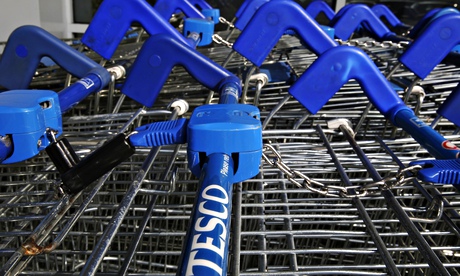Franchising, retail, business

19/10/2014
Memo to staff from CEO Dave Lewis indicates imminent ‘clear and accurate indication of income’ and update for shareholders on investigation
Tesco is expected to blame a small group of staff for deliberately misleading its auditors about a £250m profits black hole, when the UK’s largest supermarket group finally reports its delayed half year results on Thursday.
In a memo to staff, chief executive Dave Lewis said he was now in a position to provide a “clear and accurate indication of our income for the first half of the year”. He will also update investors on the initial findings of an investigation by auditor Deloitte and law firm Freshfields, who were called in to examine Tesco’s books in September. Investigators are thought to have found evidence that profit manipulation began more than a year ago.
While there had been concerns that the grocer could be forced to restate profits for previous years, it is understood the damage has been confined to 2014. Tesco’s trading profits are expected to have fallen to around £850m for the six months to the end of August, £250m less than the £1.1bn originally forecast.
Eight staff have been suspended so far, including UK boss Chris Bush, but no further suspensions are expected next week. Ken Hanna, audit committee chairman and non-executive director, is also expected to stand down when his six-year tenure comes to an end later this year.
The number is half the £1.6bn in trading profit delivered during the same period last year, showing just how badly hurt Britain’s largest private sector employer has been by the combined challenges of internal management turmoil, and a move away from hypermarkets to online shopping, high street convenience stores and discount retailers.
The numbers with which Tesco misled the City were not due to bookkeeping errors, according to reports yesterdayon Sunday, but to “inappropriate behaviour”.
It is thought staff booked as revenue bonus payments from suppliers which were conditional on Tesco hitting certain sales targets. When it became clear these targets would not be met, staff offered suppliers incentives in the following financial period to persuade them not to cancel the payments. A spokeswoman for Tesco declined to comment.
Any evidence of deliberate manipulation of Tesco’s accounts could prompt investors to call for a clawback of the £10m payout given to former chief executive Phil Clarke, who resigned in the summer after presiding over three profit warnings in eight months. Tesco’s share price has halved since the beginning of the year, and one of its biggest investors, Warren Buffett’s Berkshire Hathaway, has begun selling down its stake. Buffett has admitted that buying Tesco shares was a “huge mistake”.
In a memo to staff last week, Lewis said that the Financial Conduct Authority, which polices what listed companies tell their shareholders, will continue with its already announced investigation, freeing the grocer’s senior management to focus on reviving the business.
The big four supermarkets are expected to plough money into price cuts designed to ward off competition from discounters including Aldi and Lidl, in a trade war which could see operating margins fall from around 3% to an average of 2.5% over the next year to 18 months.
The forecast, by credit rating agency Moody’s, suggests Aldi and Lidl will reach a combined market share of 10% over the next two years, from 8.3%, with increasing numbers of stores piling the pressure on the big four.
Moody’s believes, Morrisons, which is less reliant on big out-of-town stores, is better placed to meet the challenge that Tesco and Sainsbury’s, whose bigger outlets are becoming less popular with shoppers.
Tesco’s auditor PwC flagged the accounting of promotional payments discounts and rebates from suppliers in the last annual report, warning there was a “risk of manipulation” of such payments. PwC claims to have reviewed them in detail before signing off on the accounts.
But no action was taken until the arrival of Lewis, who previously worked at consumer goods group Unilever. He was approached by a whistleblower shortly after joining on 1 September.
On 22 September, Lewis announced the estimated £250m overstatement and delayed publication of the first half results until 23 October. He blamed “accelerated recognition of commercial income”.
The City is hoping for some news from Lewis on his plan to turn Tesco’s fortunes around. There has been speculation Tesco may sell assets to fund a restructure and price war with the discounters. Dunnhumby, the division which manages its Clubcard loyalty scheme, has been mooted as a potential disposal, as has Tesco’s Asian business, which broker Shore Capital values at up to nearly £10bn.